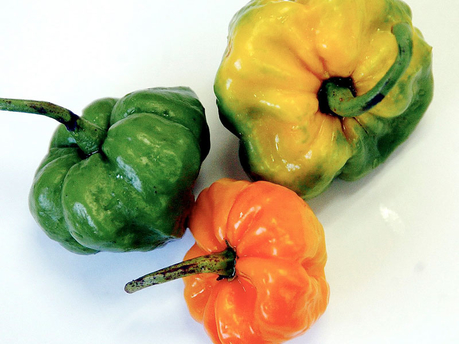 Jamaican Scotch bonnet peppers
Jamaican Scotch bonnet peppers
Christopher Serju,
Long popular among Caribbean people who for the most part enjoy an extensive range of spicy foods, hot peppers are coming under the microscope in the region, with the aim of exploring the many potential applications, far beyond the traditional uses in the kitchen.
The Caribbean Agricultural Research and Development Institute (CARDI) has signed a memorandum of understanding with the Trinidad-based Caribbean Industrial Research Institute – whose mandate includes promoting, encouraging and assisting the growth and development of manufacturing industries in Trinidad and Tobago – to explore the industrial uses of hot pepper.
Among the first projects to be undertaken is looking into the potential for developing a pepper spray formulation from the scorpion pepper out of Trinidad.
Pepper spray, as the name suggests, is an aerosol propelled chemical which when dispersed into the eyes causes swelling of the mucous membranes of the upper respiratory tract, resulting in intense pain and often temporary blindness.
It is used in self-defence against human and animal attacks, as well as for riot and crowd control.
Hottest in the world
Fayaz Shah, head of CARDI’s commercial production unit, explained that this initiative was triggered by a very significant event which took place for the Caribbean in 2012.
Shah told reporters during the recent Caribbean Week of Agriculture in Guyana: “The scorpion hot pepper (out of Trinidad) was rated by the Hot Pepper Chile Institute out of New Mexico, USA, as the hottest pepper in the world at over two million Scoville units.
“What it has done is that it has put the Caribbean back on the map in terms of international suppliers who have started to demand hot peppers again from the region.
“Right now we have requests for over 180,000 kilograms of hot pepper for processors in North America, and this is where it starts and these processors are not necessarily hot sauce processors but some are involved in using it for security purposes.”
He explained further: “Capsaicin, which is the active ingredient in hot peppers because of the heat content, is being used in Mace sprays and sold commercially in the United States, and that has created a huge demand for it because of the heat content in that scorpion.
“It is even hotter and will be an even more significant weapon as we move forward. It has never been looked at, but is now being looked at with the aim of capturing capsaicin and putting it to use in some of these industrial-type products.”
In fact, Dr Arlington Chesney, executive director of CARDI, has expressed concern about the potential liver damage for persons eating the scorpion, and advised that it is mandatory for persons handling the pepper, such as when reaping, to use gloves.
“It is that hot,” Chesney told reporters.










